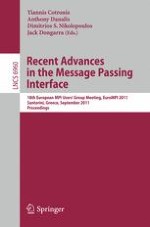2011 | Book
Recent Advances in the Message Passing Interface
18th European MPI Users’ Group Meeting, EuroMPI 2011, Santorini, Greece, September 18-21, 2011. Proceedings
Editors: Yiannis Cotronis, Anthony Danalis, Dimitrios S. Nikolopoulos, Jack Dongarra
Publisher: Springer Berlin Heidelberg
Book Series : Lecture Notes in Computer Science
